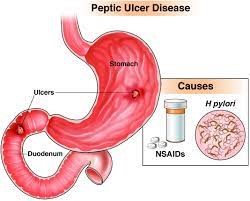Etiology and Risk Factors
- The main causes of peptic ulcers are infection with H. pylori bacteria and long-term use of NSAIDs.
i.H. pylori is a spiral-shaped bacterium that colonizes the stomach and duodenum. It can damage the mucosa by producing enzymes, toxins, and inflammatory substances. It can also interfere with the production of protective mucus and bicarbonate in the stomach. H. pylori infection is very common, affecting about half of the world's population. It is more prevalent in developing countries, where it is usually acquired in childhood. It can be transmitted from person to person through oral-oral or fecal-oral routes, or through contaminated food or water.
ii.NSAIDs are a group of drugs that are used to relieve pain, inflammation, and fever. They include aspirin, ibuprofen, naproxen, celecoxib, and others. NSAIDs can cause peptic ulcers by inhibiting an enzyme called cyclooxygenase (COX), which is involved in the synthesis of prostaglandins. Prostaglandins are substances that protect the mucosa from acid and injury. NSAIDs are widely used for various conditions such as arthritis, headache, menstrual cramps, and sports injuries. They can increase the risk of peptic ulcers by 2 to 4 times, especially if taken at high doses, for long periods, or in combination with other drugs such as steroids or anticoagulants.
- Other risk factors for peptic ulcers include:
- Smoking: Smoking can increase acid secretion, reduce blood flow to the mucosa, impair healing of ulcers, and reduce the effectiveness of medications.
- Alcohol: Alcohol can irritate the mucosa, increase acid production, and interfere with the action of prostaglandins.
- Stress: Stress can stimulate acid secretion and impair mucosal defense mechanisms. However, stress alone does not cause peptic ulcers unless there is also H. pylori infection or NSAID use.
- Spicy foods: Spicy foods do not cause peptic ulcers, but they may worsen symptoms in some people who have existing ulcers.
- Genetic factors: Some people may have a genetic predisposition to peptic ulcers due to variations in genes that affect acid secretion, mucosal protection, or immune response to H. pylori.

Nursing Test Bank
Naxlex Comprehensive Predictor Exams
Questions on Etiology and Risk Factors
Correct Answer is C
Explanation
Correct Answer is A
Explanation
Correct Answer is B
Explanation
Correct Answer is D
Explanation
Correct Answer is B
Explanation
Correct Answer is A
Explanation
Correct Answer is D
Explanation
Correct Answer is C
Explanation
Correct Answer is C
Explanation
Correct Answer is A
Explanation
Correct Answer is A
Explanation
Correct Answer is C
Explanation
Correct Answer is D
Explanation
Correct Answer is A
Explanation
Correct Answer is C
Explanation
Correct Answer is C
Explanation
Correct Answer is C
Explanation
Correct Answer is C
Explanation
Correct Answer is B
Explanation
Correct Answer is B
Explanation
Search Here
Related Topics
More on Nursing
Free Nursing Study Materials
Access to all study guides and practice questions for nursing for free.
- Free Nursing Study Trials
- Free Nursing Video tutorials
- Free Nursing Practice Tests
- Free Exam and Study Modes
- Free Nursing Revision Quizlets
